http://maicesdelnansa.blogspot.com.es/2013/08/algunos-datos-sobre-la-molineria-en_22.html
Nansa River Cantabria Spain
Corns of Nansa River
Just another WordPress.com site
03 May 2015 Leave a comment
http://maicesdelnansa.blogspot.com.es/2013/08/algunos-datos-sobre-la-molineria-en_22.html
Nansa River Cantabria Spain
Corns of Nansa River
03 May 2015 Leave a comment
in Uncategorized Tags: Agricultura sostenible en Cantabria, Cantabria, Cantabria y el Nansa, Comenius EU Project 2015 April Spain meeting, IES Santa Clara Comenius Green Skills for Global Change
13 Apr 2015 Leave a comment
<p style=” margin: 12px auto 6px auto; font-family: Helvetica,Arial,Sans-serif; font-style: normal; font-variant: normal; font-weight: normal; font-size: 14px; line-height: normal; font-size-adjust: none; font-stretch: normal; -x-system-font: none; display: block;”> <a title=”View The Sustainability Game on Scribd” href=”https://es.scribd.com/doc/261768990/The-Sustainability-Game” style=”text-decoration: underline;” >The Sustainability Game</a></p>https://www.scribd.com/embeds/261768990/content?start_page=1&view_mode=scroll&show_recommendations=true
21 Mar 2015 Leave a comment
21 Mar 2015 Leave a comment
in COEMNIUS PROKJECT GREEN SKILLS FOR GLOBAL CHANGE, Green Skills for Global Change, textos y materiales sobre sostenibilidad, Uncategorized Tags: Desarrollo sostenible en Cantabria, desarrollo y sostenibilidad medioambiental, Eliseo Rabadán, Filosofía de la Ciencia y la Técnica, Green Skills Global Change, greenandverde IES Santa Clara, IES Santa Clara Comenius Green Skills for Global Change
15 Feb 2015 Leave a comment
in Alimento marino, COEMNIUS PROKJECT GREEN SKILLS FOR GLOBAL CHANGE, Green Skills Global Change Tags: acuicultura en Cantabria y Europa, Cantabria green, IES Santa Clara Comenius Green Skills for Global Change
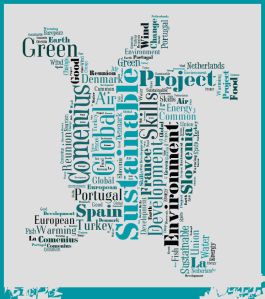
greenturtle
La acuicultura, siguiendo su definición oficial, es todo aquello relacionado con la crianza de seres vivos acuáticos, animales, y plantas. Debido al cada vez más rápido desarrollo y crecimiento de la población humana, la acuicultura, supone un gran método para conseguir, no solo alimentos, sino también materias primas para, por ejemplo, medicamentos. Por tanto, el tener una instalación como es la que hemos visitado, no es sino una futura ventaja, a pesar de los recortes gubernamentales. 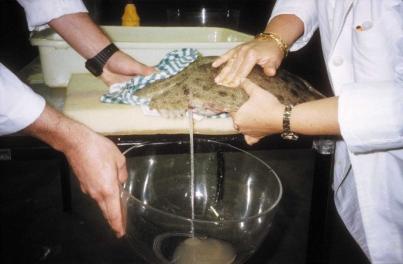
Este tipo de instalaciones, trabajan para descubrir nuevas formas de optimizar la obtención de los recursos que proporciona la acuicultura, investigando la reproducción de los peces, buscando un alimento optimo para su cría, en definitiva, hacer más rápida y rentable las operaciones de la acuicultura.
En mi opinión, invertir en este tipo de investigaciones e instalaciones no es sino un importante valor de futuro, para evitar problemas relacionados con temas tan importantes como la nutrición en el mundo, el hambre que tanto acecha en muchas regiones. Tener una fuente de abastecimiento de un recurso tan importante como este, además, podría tener un gran valor económico en el futuro, imaginense un mundo en el que escasea cierto tipo de pez, y que estás instalaciones pueden conseguir ejemplares de manera, quizá no ilimitada, pero relativamente fácil. Esos ejemplares, serían altamente cotizados, con lo que conllevaría un beneficio económico importante para continuar investigando, o para otro tipo de fines.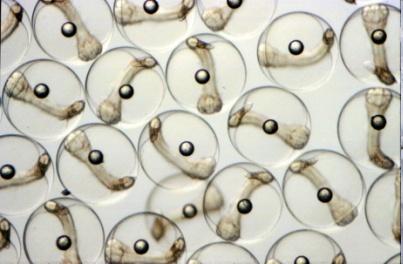
Fish farming, following it’s official definition, is everything related with the fish and acuatic plants farming. Due to the faster growing of the human population, fish farming, has become a great way to get, not only food, but also materials to make, for example, drugs. For that, having a facility like the one we’ve visited, it’s a huge future advantage, even with the gubernamental changes.
This kind of facility, works in order to discover new ways of optimizing the resources obtaining that the fish farming give us, researching the fish breed, searching for an optimal food, ultimately, making the fish farming faster and more profitable.
In my opinion, investing on this kind of researches and facilities is not only a future point, to avoid problems like the world’s nutrition, the hungry that affect a lot of countries in the world. Having a materials source like this one, could be also important, economically speaking. Imagine a world where a fish scarce, and, someway, this kind of facilities can provide you with it. Of course, if it’s a rare animal, it will be really good paid, so it would become a great money source too, in order to improve the research or anything else.
Cantabria Spain
Author : Carlos González Díaz 1ºG bachillerato ciencias
13 Feb 2015 Leave a comment
in AGUA Y SOSTENIBILIDAD, Green Skills for Global Change Tags: Cantabria, IES santa Clara Comenius environment and sustainability
This was my first intercultural experience and, although started with nerves and fear, has proved to be a wonderful experience 
After a long journey by bus, plane and train, we arrived exhausted at the station in Emmen were waiting families with whom we were staying. At first, because I did not know them and the language was so nervous she would not come out and the words. When we got home I had prepared dinner was very tasty but as he had taken something on the train was not very hungry. Not to make them ugly, I took it. I went straight to bed because all I wanted was sleep, I needed it.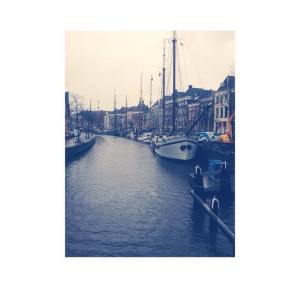
The day was still nervous and spoke little, but less good than the day before. That day, at 8.30 had to be at his school because it was where we came for the bus. It was impressive pile of bikes that had, is one of the things that has struck me in Holland, exercise while not contaminated with so many cars. We could not ride bikes to school because it rained a lot. Already at school, wait for everyone arrived and once the bus arrived they took us to visit many places one was Groningen 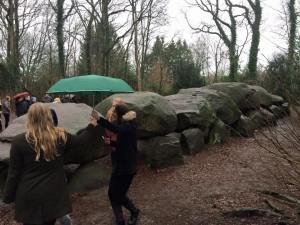
Before going there, we went to visit a dolmen stone, also a typical mill and later we were watching Groningen: channels, a museum, some buildings, etc … but the weather did not accompany us. 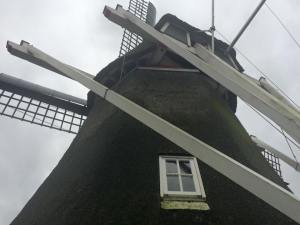
After seeing these sites, which were very nice we went to eat at a restaurant boat is in one of the channels. It was very original, ate well and later had free time and got some maps so we knew where we had to go back later and not lost. As we had two hours, I went with Manuel, one of the Spanish comrades who had come with me, Anja was the girl that I stayed home with Suzanne was another Dutch and more girls. As I did not know much, hardly spoke and that afternoon, except as beautiful places I have seen in Groningen… We each in our homes at about 5 pm and we were resting the day. 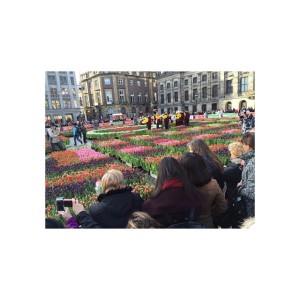
On Friday morning we had to be about 8.30-9 at school, because it was the day of the debate and presentations. When we arrived there was a list that told us who were in the group. 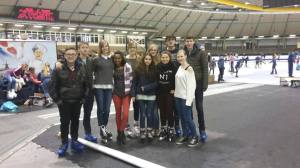
First we had the presentations and were fun, later in groups we were shown around the school to meet him. It was very, very big, awesome. We were shown around the school to answer some questions and who chanced more, is wearing a necklace Hawaiian style.
After introductions, we began to prepare for the evening, we had the great debate in the Public Library. We had 4 classes of 20 minutes each class, 2 classes before lunch and another 2 after eating. He was going to discuss two topics:
“If the government had to provide drinking water, free of charge, when temperatures are very high.”
“If everyone had to catch rainwater for your own use.”
In class we explain how we had to prepare, to do well in the debate. Each had to prepare an argument for or against, on each topic. Classes were good. Once finished, we went each to our home as we had free time until 7 we had to be in the library. My afternoon was fun as we went horseback riding with two other girls, a Dutch (Suzanne) and Turkish (Tilbe). We laughed a lot and had fun though unfortunately fell Tilbe. Already in the library, we saw that was awesome because it was big. I was very nervous, because I speak in public not wearing very well. Once seated and all, each in our chairs, chose 16 people of all countries that had come Turkey, Reunion Island, Slovenia, Portugal, Denmark, Holland and Spain. In those 16 people who luckily my not touched me, but Manuel and Sara yes, divided into 2 groups of 8 people, which in turn were divided these 8 people: 4 people in favor and 4 persons against the subject they were presenting.
Ambos debates estuvieron muy divertidos y nos reímos un montón con los argumentos y las preguntas que se hacían unos a otros, porque a las personas que les tocó, lo hicieron muy bien, poniéndole humor al asunto. A los ganadores de cada debate les dieron una especie de termo por haber participado. Cuando el debate en la gran biblioteca pública terminó, nos fuimos a casa e hicimos una especie de fiesta con algunas de las personas. Estuvimos bailando y cantando hasta muy tarde, y así pude conocer más a las personas que fueron a Holanda. Eran muy agradables y muy simpáticas. Ese día fue uno de los mejores con diferencia.
The next day, the last day in Holland, in the morning we could sleep late, but not so late as we had been to go to the ice rink. We left home and went for Maureen (Dutch) and Jure (Slovenian) and had an hour drive to where the ice rink.
There we expected more guys, and Manuel among them. When we entered the ice we saw was huge, impressive and stayed there until 4 in the afternoon. We got home about 5:30 or so and stayed until 7.30 at home, got changed and went as beginning at 8 farewell party organized by the Dutch. The food was very tasty, and the party was well organized. We were there until 12, we said goodbye to everyone and all that most would not see them and then some went out partying in Emmen and others went to sleep. That night we had a wonderful although we slept very little and the next day had to get up early were very exhausted.
We arrived at the station where we waited for the train at 9:30 and we had to say goodbye to the family. We were all very sad because even if they were a few days we’ve been there have been the best ever, and it has taken them fondly very quickly, since you were 24 hours with them. The family that touched me has been very generous to me, treated me very well and I hope she comes (Anja) to Spain.
By Elisa Obregón Gutiérrez – 2ºF BACHILLER
IES Santa Clara, Santander. Cantabria-Spain
31 Jan 2015 Leave a comment
in COEMNIUS PROKJECT GREEN SKILLS FOR GLOBAL CHANGE, COMENSUSTAINJUSTICE, Green Skills for Global Change, Green Skills Global Change, Uncategorized Tags: IES Santa Clara Comenius 2014 15